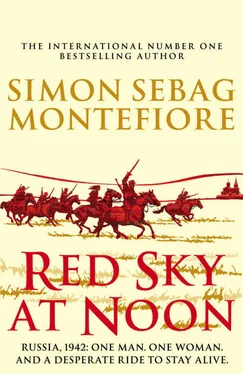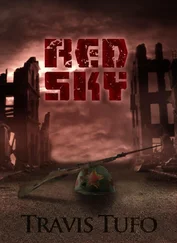‘He knows!’ whispered Svetlana.
‘Oh my God, what did he say?’ replied Martha.
‘You didn’t tell anyone, did you?’
‘Of course not. What did he say?’
Svetlana just shook her head: ‘I’ve never seen my father like that. He slapped me. He tore up the letters.’
‘What did Lev say?’
‘He doesn’t know.’
‘But he must be coming back soon?’
‘Maybe,’ said Svetlana.
‘Are you going to see him again?’
Svetlana remembered her promise to Nanny. ‘No, never again.’
Maybe that’s for the best, thought Martha. ‘Your father… Be careful, Svetochka.’
They had reached the street corner where her bodyguard, Klimov, was waiting with the Packard.
As the girls kissed each other goodbye, Svetlana glanced at her watch and enjoyed the sensation of power, the fact that she had control of her life. Amid this perpetual surveillance and her father’s relentless supervision, she was still her compact self, her own kingdom. Only she ruled her heart.
‘Svetlana!’ Klimov was holding open the car door.
‘I’d like to walk a bit… I’d like to wander around the House of the Book.’
‘I’d prefer you in the car,’ said Klimov.
‘Drive behind, if you like?’
The black Packard purred slowly behind her as she set off along Ostozhenka, then past the university and the Kremlin and up Gorky Street towards her favourite bookshop. Waving at Klimov, dear Klimov the kind Chekist who wanted to help her, who wanted her to know love, she skipped inside where she found herself surrounded by the familiar ramparts of shelves, and the sweet smell of book leather and yellow paper and glue. Her eyes scanned the shelves for something to take home, a new American novel perhaps? A new history book! Books were so romantic, she thought, book-lovers all over the world – London, New York and Moscow – were linked in a web of sensibility and freedom.
She only hesitated for a moment and then she walked straight through the shop to the back where the metal lift brought up the books from the storeroom downstairs, and where there were piles of books in their boxes, not yet unpacked. She pressed the button for the lift, which shook and groaned but nothing happened. Swearing to herself a little, Svetlana ran down the steps. It was cooler down there. The tang of book glue and new paper made her nose twitch. In the basement, a young man with big ears was unpacking a box of her father’s speeches and this amused her.
‘Excuse me,’ he said in a southern accent, Stavropol maybe, ‘but you’re not allowed down here.’
She smiled at him winningly.
‘No, really, I’ll get sacked.’
‘No you won’t,’ she said. ‘Not if I tell them not to…’
‘Who are you? Hey, you! Please go back upstairs.’
But she could see the light now from the loading door. ‘It will be quicker to get out this way!’ she called and ran down the ramp and out into the brightness. Then she turned up the side street, peeking into Gorky Street where she could see Klimov leaning on the car, smoking a cigarette, and jumped on a tram.
She was free. Not for long. But free.
Benya opened his eyes. The bandages and the cast around his hip and right thigh were reassuringly tight. He enjoyed the float of the morphine, its timeless haze. He was propped up so he could see the entire room.
Everything was drab and washed-out in the ward. All around him were steel beds, brown sheets, soiled blankets and the smells of carbolic acid, disinfectant, the hot fug of strange bodies, the fruity sugariness of putrefaction and the acrid urine of the living. The boy two beds down had died; they hadn’t got round to removing him yet. Then the morphine bore Benya away again: here he was visiting his parents, and grooming Silver Socks, next he was swooping through roiling skies on to the steppes where he saw Tonya and Kapto and the little girl. He woke up, sickened, with the rust of blood in his mouth.
He heard the hiss of whispering down the ward, and noticed a retinue of nurses and doctors and a general close by, three beds away. High and buzzed, nothing could dent the rapture of being free and redeemed – but as always the panic of disappointed joy struck. Things had gone wrong before. To make it back to Russian lines and then be sentenced to death unless he went back – he had almost collapsed. But he had done his part. He had not seen Kobylov again, a boon in itself, and Mogilchuk had delivered the news of his deliverance. And now? Now he was alive.
The general was getting closer, speaking to each patient, the doctor commenting and the anaemic voices of flimsy men responding. Sharp questions to project urgency and care. ‘How are you feeling? What unit? Where did you serve? Stalingrad Front?’ Then another note, the moving-on-we-have-ten-wards-to-get-through tone: ‘Your service to the Motherland is appreciated. Good luck in your recovery. Long live Stalin!’
They were at the next-door bed and then it was Benya’s turn. He already knew the questions by heart and was tempted to call out the answers in one insolent blurt to save time when he heard the general speak. ‘Leave us a moment, comrades, I know this one. Yes, thanks, nurse, I’ll pull up a chair.’ The accent was so Georgian. Benya was suddenly very much awake.
‘Benya Golden,’ said Colonel General Hercules Satinov, older but still lean and trim, a man to whom power seemed as natural as angst to a Jewish writer. Once, in another almost forgotten life, at a beautiful woman’s house, Benya had seen Satinov dance the lezginka , the waist in his Stalinka tunic tight and wasp-like, the footwork in his boots impressively fleet. A vanished life.
Benya, so exuberant one second earlier, shrank in the icy presence of Stalin’s comrade-in-arms. What had they in store for him this time?
‘How are you feeling?’
‘I was feeling good…’ Benya said. The past tense, too honest.
‘Until you saw me?’ replied Satinov. ‘Again.’
The last time Benya had seen Satinov was when he presided over his sentencing to death, then the reprieve – to twenty-five years in Gehenna.
‘A coincidence, I am sure.’
‘You still believe in those, Golden?’
‘I want to.’
Satinov looked searchingly at Benya. ‘I am the Stavka representative on the Stalingrad Front,’ he said. ‘My front. When possible, I visit the wounded.’ A pause. ‘Your case came straight to me. I had your wounds checked; when you were asleep, I arranged for the Kremlin Clinic to send a doctor to examine you. Signing your redemption, in this particular case, I had to be certain.’ Benya knew Satinov was referring to the Sashenka Case, because he too had known Sashenka.
‘Understood,’ said Benya. ‘Thank you.’
‘You were nominated for the only medal available to Shtrafniki: Order of Glory Third Class.’
Benya shook himself. ‘Really?’ He’d never won a prize, even at school.
‘Of course it’s impossible for a Political.’
Benya had seen Satinov’s hawkish face on countless banners and newspapers; he had even passed through a town named Satinovgrad on his way to the Don. Now, in the flesh, this presence took him back: Satinov had been the close friend of Sashenka, the love of Benya’s life, and yet Stalin had assigned Satinov to ‘curate’ the case and oversee her destruction. A test; a very Stalinist one. Family, sentiment, friendship were the trappings of bourgeois sentimentality, and Stalin liked to say ‘A Bolshevik has no family but the Party’. Satinov had presided coolly over the trials and the sentences. Had he played a murky part in the whole case, had he denounced his friends, even Sashenka? Had he been particularly severe in order to save his own skin? If Sashenka was alive, Satinov would know. What things he must know…
Читать дальше












